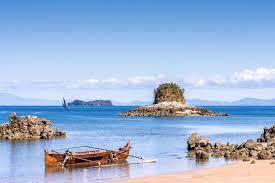
Madagascar is captivating in so many ways! Separated from the continent since millions of years, Madagascar has the most singular fauna and flora on the planet. Like the emblematic Lemurs, almost all the wildlife of the African island can be found nowhere else in the world. The mosaic of landscapes presents in Madagascar is stunning, from vast grassy plains dotted with lone baobabs to arid deserts, stony mountains, lush rain forests and paradise white sand beaches… Malagasy people have a unique blend of customs and beliefs coming from their mixed Asian and African ancestors. Traveling in Madagascar remains adventurous, but is incredibly rewarding.
HEALTH INFORMATION
We make every effort to ensure that the information posted on our website is up to date and accurate according to the latest public health recommendations; however, it is impossible for us to make changes on a daily basis.
For the most current travel health recommendations, please call our clinic as make an appointment with one of our travel health professionals.
MADAGASCAR – RECOMMENDED VACCINES
| The Yellow Fever Vaccine | A proof of vaccination against yellow fever may be required upon entry in to this country. Some travellers may not be eligible to receive this vaccine. Please enquire with your health care professional regarding your specific details. It is important to note that the vaccine should be administered at least 10 days prior to your departure. For further information, please consult with the World Health Organization (WHO) website: https://www.who.int/ith/ith- |
| Hepatitis A | Recommended for all travelers. |
| Hepatitis B | Recommended for all travelers. |
| Causes, Symptoms & Treatment – Typhoid fever | Recommended for all travelers. |
| Tetanus – Diphteria – Pertussis Vaccine | Tetanus: In exceptional circumstances (eg, stay in a region where access to health care is limited), for a person aged 18 years or older, 1 dose of DT may be given if 5 years or more has elapsed since the last dose. Otherwise, one booster dose at the age of 50*. Pertussis (Whooping Cough): 1 dose is recommended for pregnant women, for every pregnancy, regardless of immunization history and the interval since the last dose (betwen week 26 and 32). *Only applicable for Quebec. |
| Measles – Rubella – Mumps | Two doses recommended for all travelers born after 1970, if not previously given. |
| Cholera | For humanitarian workers and health care providers. |
| Flu – Influenza | Seasonal influenza occurs worldwide. The flu season usually runs from November to April in the northern hemisphere, between April and October in the southern hemisphere and year round in the tropics. Influenza (flu) is caused by a virus spread from person to person through coughing and sneezing or by touching infected surfaces. Everyone 6 months and older should get a flu vaccine yearly. Vaccine is recommended 14 days prior to departure. |
| Routine vaccines (dCaT, Polio, Meningococcal, Shingles, Pneumococcal, Hepatitis B, HPV, MMR & Varicella) | Recommended for all travelers |
| African Tick Bite Fever | Presence. All travellers should protect themselves against tick bites. |
| Transmission, Symptoms and Prevention – Rabies | For travelers at high risk of animal bites or being involved in activities with bats, dogs and other mammals. Clients who plan to visit remote areas may consider receiving this vaccine. Important to note the pre-exposure rabies vaccine is administered in 2 doses with one week interval between doses. Post-exposure vaccination is always recommended, even for those previously vaccinated. |
| Schistosomiasis | Avoid swimming in fresh water. |
| Turista – Traveler’s Diarrhea (ETEC) | Talk to your health care professional about the risks and precautionary measures to take, as well as the Dukoral® vaccine. Important to note that the Dukoral vaccine is an oral vaccine given in 2 doses, recommended at least 2 weeks prior to departure. |
| Malaria | Malaria is present in this country. The risk may be region specific. Prophylaxis measures to be discussed with the health care professional. |
| Dengue Fever, Chikungunya and/or Zika | There are many illnesses that are transmitted via mosquito bites and unfortunately we do not have vaccines to protect us against most of them. It is important to inquire with your healthcare professional regarding the specific risks and the different illnesses presently in circulation. |
RECOMMENDED MEDICATIONS
| Antimalarials Recommended | Malarone, Doxycycline or Mefloquine |
| Acetazolamide/Dexaméthasone | Recommended to prevent Acute mountain sickness (AMS). |
| Antibiotics Traveler’s Diarrhea | Azithromycin or Suprax |
MEDICAL CARE
Access to satisfying medical care in Madagascar is very limited in rural areas. But in the capital city, Antananarivo, some foreign trained medical doctors and specialists providing good health care can be found, usually in private medical facilities. The Espace Medical Clinic, the Ampasanimalo Clinic and the Ilafy Polyclinic can be quoted, all located in the capital city. In the event of a serious disease, medical complications or a severe injury, an evacuation to another country is required.
In case of emergency in Madagascar, call 22 625 66 (Espace Medical Clinic), 22 235 55 (Ampasanimalo Clinic) or 22 425 66 (Ilafy Polyclinic). But be aware that the waiting time can be very long as ambulances often get stuck in traffic jams.
Access to medicines is not good in Madagascar, especially outside of the capital city. It is thus strongly advised that you bring enough drugs with you when traveling to the country.
SECURITY ABROAD
Violent attacks have occurred on Batterie Beach, north of Toliara. Some of these attacks have resulted in fatalities.
CANADIAN EMBASSY
Emergency services
Dial 117 for emergency assistance.
